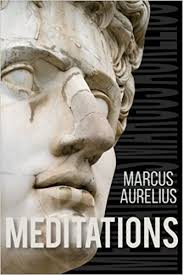Meditations Page #15
Meditations is a series of personal writings by Marcus Aurelius, Roman Emperor from 161 to 180 AD, recording his private notes to himself and ideas on Stoic philosophy. Marcus Aurelius wrote the 12 books of the Meditations in Koine Greek as a source for his own guidance and self-improvement.
XXII. Either this world is a kosmoz or comely piece, because all disposed and governed by certain order: or if it be a mixture, though confused, yet still it is a comely piece. For is it possible that in thee there should be any beauty at all, and that in the whole world there should be nothing but disorder and confusion? and all things in it too, by natural different properties one from another differenced and distinguished; and yet all through diffused, and by natural sympathy, one to another united, as they are? XXIII. A black or malign disposition, an effeminate disposition; an hard inexorable disposition, a wild inhuman disposition, a sheepish disposition, a childish disposition; a blockish, a false, a scurril, a fraudulent, a tyrannical: what then? If he be a stranger in the world, that knows not the things that are in it; why not be a stranger as well, that wonders at the things that are done in it? XXIV. He is a true fugitive, that flies from reason, by which men are sociable. He blind, who cannot see with the eyes of his understanding. He poor, that stands in need of another, and hath not in himself all things needful for this life. He an aposteme of the world, who by being discontented with those things that happen unto him in the world, doth as it were apostatise, and separate himself from common nature's rational administration. For the same nature it is that brings this unto thee, whatsoever it be, that first brought thee into the world. He raises sedition in the city, who by irrational actions withdraws his own soul from that one and common soul of all rational creatures. XXV. There is, who without so much as a coat; and there is, who without so much as a book, doth put philosophy in practice. I am half naked, neither have I bread to eat, and yet I depart not from reason, saith one. But I say; I want the food of good teaching, and instructions, and yet I depart not from reason. XXVI. What art and profession soever thou hast learned, endeavour to affect it, and comfort thyself in it; and pass the remainder of thy life as one who from his whole heart commits himself and whatsoever belongs unto him, unto the gods: and as for men, carry not thyself either tyrannically or servilely towards any. XXVII. Consider in my mind, for example's sake, the times of Vespasian: thou shalt see but the same things: some marrying, some bringing up children, some sick, some dying, some fighting, some feasting, some merchandising, some tilling, some flattering, some boasting, some suspecting, some undermining, some wishing to die, some fretting and murmuring at their present estate, some wooing, some hoarding, some seeking after magistracies, and some after kingdoms. And is not that their age quite over, and ended? Again, consider now the times of Trajan. There likewise thou seest the very self-same things, and that age also is now over and ended. In the like manner consider other periods, both of times and of whole nations, and see how many men, after they had with all their might and main intended and prosecuted some one worldly thing or other did soon after drop away, and were resolved into the elements. But especially thou must call to mind them, whom thou thyself in thy lifetime hast known much distracted about vain things, and in the meantime neglecting to do that, and closely and unseparably (as fully satisfied with it) to adhere unto it, which their own proper constitution did require. And here thou must remember, that thy carriage in every business must be according to the worth and due proportion of it, for so shalt thou not easily be tired out and vexed, if thou shalt not dwell upon small matters longer than is fitting. XXVIII. Those words which once were common and ordinary, are now become obscure and obsolete; and so the names of men once commonly known and famous, are now become in a manner obscure and obsolete names. Camillus, Cieso, Volesius, Leonnatus; not long after, Scipio, Cato, then Augustus, then Adrianus, then Antoninus Pius: all these in a short time will be out of date, and, as things of another world as it were, become fabulous. And this I say of them, who once shined as the wonders of their ages, for as for the rest, no sooner are they expired, than with them all their fame and memory. And what is it then that shall always be remembered? all is vanity. What is it that we must bestow our care and diligence upon? even upon this only: that our minds and wills be just; that our actions be charitable; that our speech be never deceitful, or that our understanding be not subject to error; that our inclination be always set to embrace whatsoever shall happen unto us, as necessary, as usual, as ordinary, as flowing from such a beginning, and such a fountain, from which both thou thyself and all things are. Willingly therefore, and wholly surrender up thyself unto that fatal concatenation, yielding up thyself unto the fates, to be disposed of at their pleasure. XXIX. Whatsoever is now present, and from day to day hath its existence; all objects of memories, and the minds and memories themselves, incessantly consider, all things that are, have their being by change and alteration. Use thyself therefore often to meditate upon this, that the nature of the universe delights in nothing more, than in altering those things that are, and in making others like unto them. So that we may say, that whatsoever is, is but as it were the seed of that which shall be. For if thou think that that only is seed, which either the earth or the womb receiveth, thou art very simple. XXX. Thou art now ready to die, and yet hast thou not attained to that perfect simplicity: thou art yet subject to many troubles and perturbations; not yet free from all fear and suspicion of external accidents; nor yet either so meekly disposed towards all men, as thou shouldest; or so affected as one, whose only study and only wisdom is, to be just in all his actions. XXXI. Behold and observe, what is the state of their rational part; and those that the world doth account wise, see what things they fly and are afraid of; and what things they hunt after. XXXII. In another man's mind and understanding thy evil Cannot subsist, nor in any proper temper or distemper of the natural constitution of thy body, which is but as it were the coat or cottage of thy soul. Wherein then, but in that part of thee, wherein the conceit, and apprehension of any misery can subsist? Let not that part therefore admit any such conceit, and then all is well. Though thy body which is so near it should either be cut or burnt, or suffer any corruption or putrefaction, yet let that part to which it belongs to judge of these, be still at rest; that is, let her judge this, that whatsoever it is, that equally may happen to a wicked man, and to a good man, is neither good nor evil. For that which happens equally to him that lives according to nature, and to him that doth not, is neither according to nature, nor against it; and by consequent, neither good nor bad.
Translation
Translate and read this book in other languages:
Select another language:
- - Select -
- 简体中文 (Chinese - Simplified)
- 繁體中文 (Chinese - Traditional)
- Español (Spanish)
- Esperanto (Esperanto)
- 日本語 (Japanese)
- Português (Portuguese)
- Deutsch (German)
- العربية (Arabic)
- Français (French)
- Русский (Russian)
- ಕನ್ನಡ (Kannada)
- 한국어 (Korean)
- עברית (Hebrew)
- Gaeilge (Irish)
- Українська (Ukrainian)
- اردو (Urdu)
- Magyar (Hungarian)
- मानक हिन्दी (Hindi)
- Indonesia (Indonesian)
- Italiano (Italian)
- தமிழ் (Tamil)
- Türkçe (Turkish)
- తెలుగు (Telugu)
- ภาษาไทย (Thai)
- Tiếng Việt (Vietnamese)
- Čeština (Czech)
- Polski (Polish)
- Bahasa Indonesia (Indonesian)
- Românește (Romanian)
- Nederlands (Dutch)
- Ελληνικά (Greek)
- Latinum (Latin)
- Svenska (Swedish)
- Dansk (Danish)
- Suomi (Finnish)
- فارسی (Persian)
- ייִדיש (Yiddish)
- հայերեն (Armenian)
- Norsk (Norwegian)
- English (English)
Citation
Use the citation below to add this book to your bibliography:
Style:MLAChicagoAPA
"Meditations Books." Literature.com. STANDS4 LLC, 2025. Web. 24 Feb. 2025. <https://www.literature.com/book/meditations_76>.








Discuss this Meditations book with the community:
Report Comment
We're doing our best to make sure our content is useful, accurate and safe.
If by any chance you spot an inappropriate comment while navigating through our website please use this form to let us know, and we'll take care of it shortly.
Attachment
You need to be logged in to favorite.
Log In